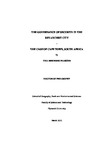The governance of security in the revanchist city- The case of Cape Town, South Africa
| dc.contributor.supervisor | Yarwood, Richard | |
| dc.contributor.author | Paasche, Till Frederik | |
| dc.contributor.other | School of Geography, Earth and Environmental Sciences | en_US |
| dc.date.accessioned | 2012-03-26T10:12:28Z | |
| dc.date.available | 2012-03-26T10:12:28Z | |
| dc.date.issued | 2012 | |
| dc.date.issued | 2012 | |
| dc.identifier | 10190836 | en_US |
| dc.identifier.uri | http://hdl.handle.net/10026.1/919 | |
| dc.description.abstract |
The governance of security in the revanchist city- The case of Cape Town, South Africa Much has been written on the revanchist city (for example Smith, 1996; MacLeod, 2002; Belina and Helms, 2003) and the reclaiming of space from so-called ‘undesirables‘ through the means of the police. Here, the guiding ideas are policing strategies such as the ‘broken windows syndrome‘ (Kelling and Wilson, 1982) and ‘zero tolerance policing‘ (Giuliani and Bratton, 1994; Beckett and Herbert, 2008; Herbert and Beckett, 2010). However, the role of private security companies in the reclaiming of public space remains under-researched. Using a case study in Cape Town this research gap will be addressed in this study. Conceptualising the thesis through governance and territoriality, it will examine how revanchist ideas of reclaiming space from urban poor and street people lead to exclusionary processes in the quest for sanitised spaces. By taking private security companies out of the environment of mass private property in which they are most commonly studied (Shearing and Stenning, 1983; von Hirsch and Shearing, 2000; Wakefield, 2003), this thesis examines their role and impact on public spaces within the revanchist environment of Cape Town, South Africa. Here, fast and extensive developments in governance as well as in urban life, interwoven with exceptionally high crime rates, have created a flourishing market for private security companies. In this context this thesis examines the case of private policing companies operating in the core public spaces of the city; the research reveals their social ordering function and powers are the same as those usually associated with the public police. Drawing on these insights it is claimed that private policing companies manifest an evolution from private security companies towards the police, and that this continues the pluralisation of the policing landscape. By mapping the privately policed spaces within the case studies and analysing the functions the different governance actors carry out, this thesis also argues that social development actors become part of the policing landscape. Analysing the governance landscape and its close ties to private policing, it is argued that social development is becoming the softer side of policing. Combining effective private policing companies with social development in support of the state reveals that private governance actors are indeed powerful players in public spaces. Drawing on this governance of security and its associated power, the final argument will be that a different kind of public space is being developed. After consideration of the particular history of defunct public spaces in South Africa, it is claimed that no single public space exists anymore, but that we now face different public spaces, characterised through their different norms and rules, and the social groups that use them. | en_US |
| dc.language.iso | en | en_US |
| dc.publisher | University of Plymouth | en_US |
| dc.subject | Private security companies | |
| dc.subject | Cape Town | |
| dc.subject | Revanchist city | |
| dc.subject | South Africa | |
| dc.subject | Policing | en_US |
| dc.title | The governance of security in the revanchist city- The case of Cape Town, South Africa | en_US |
| dc.type | Thesis | |
| dc.identifier.doi | http://dx.doi.org/10.24382/4676 |
Files in this item
This item appears in the following Collection(s)
-
01 Research Theses Main Collection
Research Theses Main


